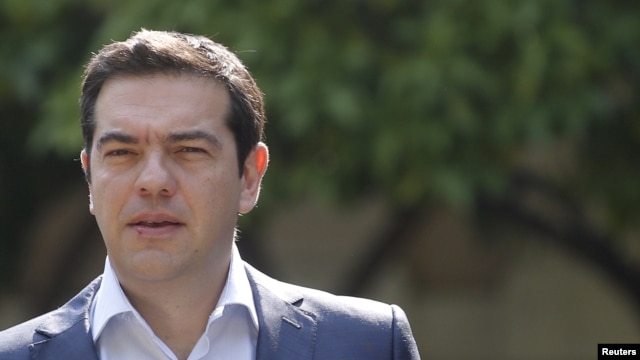Europe Ponders Next Move After Greece Rejects Bailout
Greek Prime Minister Alexis Tsipras leaves Maximos Mansion to meet with party leaders at the Presidential Palace in central Athens, Greece, July 6, 2015.
Last updated on: July 06, 2015 7:33 AM
Greek Prime Minister Alexis Tsipras said he is ready to return to the negotiating table after 61 percent of voters in a snap referendum voted against Greece accepting further austerity measures in exchange for financial bailout funds. He said the mandate strengthens his ability to negotiate a better deal for this country.
Some of his fellow eurozone partners, however, are not impressed with the referendum results. Germany is taking a hardline stance against Greece and it efforts to renegotiate for additional funds.
"In light of yesterday's decision by Greek citizens, there is no basis to enter into negotiations on a new aid program," Steffen Seibert, a spokesman for German Chancellor Angela Merkel, said Monday.
Sigmar Gabriel, Germany's vice chancellor and economic minister, told a German newspaper that the Greek government is leading its people "onto a path of bitter austerity and hopelessness.''
Tsipras has "torn down the last bridges across which Europe and Greece could move toward a compromise,'' Gabriel told the daily Tagesspiegel.
"The ball is in now in Greece's court," Finnish Finance Minister Alexander Stubb said. "Negotiations can only be resumed when the Greek government is willing to cooperate and commit itself to measures to stabilize the country's public economy and implement the structural reforms required for debt sustainability."
French reaction
Meanwhile, the French finance minister held out the possibility of further talks with Greece. Michel Sapin said discussions with Greece are not "taboo," but added Greece has no hope of recovering from its financial chaos "in the months and years to come" with its current repayment obligations.
"Europe is facing a difficult moment, but it is not in difficulty itself," Sapin said. "Europe will show it is strong by protecting itself."
French European Affairs Minister Harlem Desir said the Greek "no" vote Sunday in the snap referendum did not mean Greece wants to leave the euro, but talks with Greece must start soon "on a serious basis."
The European Commission said it "respects" the result of the referendum. VOA


No comments:
Post a Comment